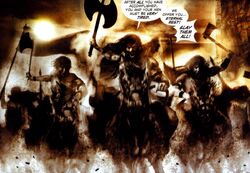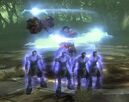Cronusfire01 (talk | contribs) |
No edit summary |
||
| Line 27: | Line 27: | ||
Interestingly, one of the men the Barbarian King summons is the [[Captain|Boat Captain]] from [[God of War]], implying that the captain is a barbarian himself, or at least a member of the same race. |
Interestingly, one of the men the Barbarian King summons is the [[Captain|Boat Captain]] from [[God of War]], implying that the captain is a barbarian himself, or at least a member of the same race. |
||
| + | |||
| + | <gallery captionalign="left"> |
||
| + | BM.jpg|Barbarian Mercenary |
||
| + | </gallery> |
||
==Trivia== |
==Trivia== |
||
Revision as of 01:24, 22 November 2011

Alrik and his Barbarian army.
| “ | The barbarians to the east numbered in the thousands, and descended upon the Spartans without mercy. | ” |
Greek History
The ancient Greeks considered other non-Greeks as Barbarians. They were nomadic and/or war-like savage big groups of people, who often sparred with Greece. Some well known non-Greek peoples located near ancient Greece included the Illyrians (Albania), Thracians (Bulgaria), Phrygians (Anatolia), Scythians (Black Sea area) and Persians (Middle East).
In The God of War Series
Quest For Ambrosia
In a far land in the east, a Barbarian prince, Alrik found his father dying from an illness. After hearing from an elder about the powers of ambrosia, Alrik and an army of Barbarians journeyed to the great nectar of the gods, not knowing that Hades, competing in a wager of the gods, chose Alrik as his champion. As they ventured into great terrains, a warrior named Danaus, who also sought the ambrosia, attacked the Barbarians, but was hastily beheaded by Alrik, who kept his head.
Upon learning the Spartans desired the ambrosia as well, the Barbarian army ambushed them, after their leader, Kratos, retrieved the ambrosia from the tree of life. A large battle ensued, causing casualties on both ends. To gain an advantage, Alrik unleashed the head of Danaus, whom he revealed to be a commander of animals. He then brought forth a flock of Rocs, using the head, to kill the Spartans. As the Rocs slashed away at Kratos, Alrik swiped the ambrosia and flew away on another Roc. Kratos then fought his way through the Rocs, upon which Hades, worried that Kratos might ruin his chances of winning the wager, sent forth the Arms of Hades to kill all Spartans in the vicinity. Determined to capture the Ambrosia, Kratos made his way passed the Arms and commandeered a Roc, leaving his men behind to die. As Kratos gained ground, Alrik tried fending off the Spartan in vain, as Kratos regained the ambrosia, and Danaus' head, as he ordered the Rocs to tear Alrik apart. A mortally wounded Alrik was then approached by Hades, who rescued him from certain death, and to destroy the Spartan who cost him the wager. Alrik then left for home, where he found his dead father being cremated. Alrik, now the new Barbarian king, then vowed vengeance on Kratos.
Threat to Sparta
In the east the Spartans observed a barbarian army form. Seeing the Barbarians as a threat, Kratos and his men went to fight and kill them. Kratos' men believed in their great captain and went to battle.
The Battle
The battle itself was less like a battle and more like a total massacre lasting only a few hours. Despite the

Alrik, in the war against the Spartans.
Spartans' great discipline and hard training in combat, they could not hold back the Barbarian Army. The Barbarians were merciless and savage, slaughtering the Spartans. Kratos and the Barbarian King faced off and the King was about to kill Kratos using his massive war hammer, but to Kratos victory was the most important thing, and he called out to Ares, promising his soul and a life of service to the God of War if he destroyed his enemies. This then led to the events of Kratos' future. Ares accepted Kratos' soul and servitude in exchange for allowing victory to him and his men. He unleashed his godly power on the barbarians, slaughtering them by burning them alive, along with killing them in other vicious and horrifying ways. He sent Harpies to give Kratos the Blades of Chaos, a pair of fiendish swords forged in the fires of Hades, Kratos then used them to decapitate the Barbarian King, ending the Barbarian threat.
Return of the Barbarians
However, Alrik would later return in God of War II, having escaped the Underworld, he sought after the Sisters of Fate to, like Kratos and other Greek Heroes on the island, change the outcome of his fate, and to gain revenge upon the Ghost of Sparta.
Barbarian Mercenaries
The Barbarian Mercenaries are the reanimated undead corpses of

Alrik summons his Barbarians
Barbarian soldiers. The Barbarian King summons them from the depths of Hades during his battle with Kratos. They wield rusted old swords, and come at Kratos, attacking him mindlessly. Kratos can quickly slay them by cutting off their legs, with his blades, followed by their head.
The Barbarians that Alrik summons during the battle have a blue like-ghost appearance, but the ones that appear after Kratos obtains the Barbarian Hammer (as a 'test' for the new weapon) look more like humans, and not undead beings.
Interestingly, one of the men the Barbarian King summons is the Boat Captain from God of War, implying that the captain is a barbarian himself, or at least a member of the same race.
Trivia
- Being "from the east" its possible (though not actually stated) that the Barbarians in God of War could have been Persians, Scythians or some other Asiatic group/nation. However, they most likely are not Persians, as they appeared in God of War: Chains of Olympus, and their appearance is nothing like the Barbarians in God of War.
- Most likely, these barbarians are from the region of Thrace, northeast of Greece proper and a barbarian stronghold in the days of Greek myth.
- The name of the Barbarian King, Alrik, appears to be Germanic, which suggests that they come from Central Europe, but this is inconsistent with Gaia's statement that they "came from the east."

